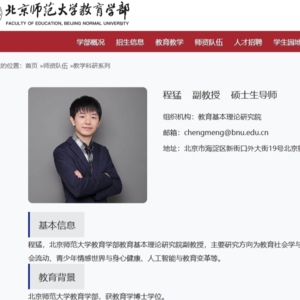《学做工》 (Learning to Labour) 是英国社会学家保罗·威利斯 (Paul Willis) 于 1977 年出版的一本关于教育和阶级再生产的著作。该书基于威利斯对 12 名来自英国工人阶级家庭的男学生的深入研究,探讨了他们如何通过对学校权威的反抗和对工人阶级文化认同的培养,最终选择了进入工人阶级劳动力市场。
威利斯认为,学校教育并非中立的,而是服务于统治阶级的意识形态。学校通过灌输学术知识和强调服从纪律,将学生划分为不同的社会阶层。工人阶级学生往往被认为不适合接受高等教育,并被引导进入低技能、低薪的工作。
然而,威利斯发现,工人阶级学生并非完全顺从学校的权威。他们会形成自己的反学校文化,以抵抗学校对他们的压迫。这种反学校文化包括对学术知识的不屑一顾,对学校规定的蔑视,以及对工人阶级生活方式的认同。
威利斯认为,工人阶级学生的反学校文化并非简单的叛逆行为,而是他们对自身阶级地位的理性认识。他们通过拒绝学校灌输的价值观,来维护自己的阶级尊严和利益。然而,这种反抗最终也导致了他们被限制在工人阶级劳动力市场内,无法实现社会阶层的向上流动。
"The Making of 'Readable People': Power and Pedagogy in the Production of Literacy" is a 2019 book by Chinese sociologist Cheng Meng that examines the experiences of rural Chinese students in their pursuit of higher education. Based on a three-year ethnographic study of two rural middle schools in China, Cheng argues that the concept of "readable people" (讀書的料), which refers to students who are considered to have the potential to succeed in school and go on to college, is a powerful social construct that shapes the educational trajectories of rural students.
Cheng found that students who were labeled as "readable people" were given more opportunities and support by teachers and school administrators, such as being placed in higher-level classes and being given extra help with their schoolwork. These students were also more likely to be encouraged to participate in extracurricular activities that were seen as preparing them for college, such as debate clubs and English language classes.
In contrast, students who were not labeled as "readable people" were often tracked into lower-level classes and given less attention by teachers. These students were also less likely to be encouraged to participate in extracurricular activities, and they were often told that they should focus on vocational training instead of college.
As a result of these differential experiences, Cheng argues that students who are labeled as "readable people" are more likely to succeed in school and go on to college, while students who are not labeled as "readable people" are more likely to drop out of school or enter low-skilled, low-paying jobs. This, in turn, contributes to the perpetuation of social inequality in rural China.
Cheng's book has been praised for its insightful analysis of the social construction of "readable people" and its exploration of the ways in which this construct shapes the educational experiences of rural Chinese students. It is an important contribution to the field of sociology of education, and it has important implications for understanding and addressing educational inequality in China.
Here are some of the key takeaways from the book:
- The concept of "readable people" is a powerful social construct that shapes the educational trajectories of rural Chinese students.
- Students who are labeled as "readable people" are given more opportunities and support by teachers and school administrators, and they are more likely to succeed in school and go on to college.
- Students who are not labeled as "readable people" are given less attention by teachers and are less likely to be encouraged to participate in extracurricular activities, and they are more likely to drop out of school or enter low-skilled, low-paying jobs.
- The social construction of "readable people" contributes to the perpetuation of social inequality in rural China.
"The Making of 'Readable People': Power and Pedagogy in the Production of Literacy" is an important book that sheds light on the complex and often contradictory ways in which the concept of "readable people" shapes the educational experiences of rural Chinese students. It is a must-read for anyone who is interested in understanding the role of education in shaping social inequality in China.



 129
129 0
0